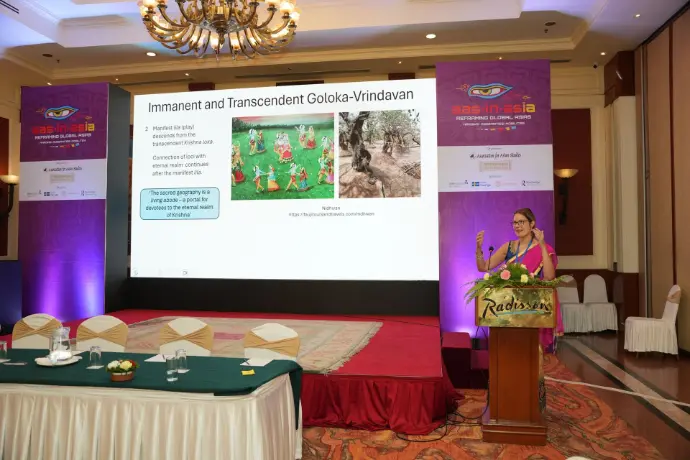Deborah de Koning presented a paper on Hinduism and Ecology at the AAS-in-ASIA conference in Nepal

From 1-4 June 2025 the AAS-in-ASIA conference ‘Reframing Global Asias’ took place in Kathmandu. This conference was organized by the Association for Asian Studies. Dr. Deborah de Koning (Tilburg University) organized a panel session ‘Reframing Ecological Perspectives for a Global Asia: What do Hindu Traditions Offer?
De Koning presented a paper about Krishna Valley in Hungary. Krishna Valley served as a case-study to explore the relevance of the intersection of sacred geographies and perceptions of the landscape in times of climate change. Krishna Valley is a co-living community of the ISKCON (Hare Krishna Movement) and a self-sustainable farm that covers 300 hectares. At this place the synchronic interconnections of Krishna Valley as part of the Global Ecovillage Network on the one hand and as a sacred geography on the other hand intersect. This intersection results in the reshaping of sustainable practices as meaningful (religious) practices and a reinterpretation of the religious tradition in the context of contemporary climate change. As an example of religious framing De Koning explained how the water purification efforts of the ISKCON community are considered a re-enactment (Imitatio Dei) of Krishna’s fight against the demon-snake Kaliya who is believed to have poisoned the Yamuna river. Another example of religious framing of sustainable practices is the eco-farming cow-protection program of the ISKCON community: this program provides Krishna devotees with the opportunity to practice devotion to cows which results in the reproduction of and partaking in Krishna’s abode (goloka- abode of cows) on earth. Framing sustainable practices as imitatio dei and as devotion to God at specific localities produces a spatial eco-religiosity which offers relevant insights for meaning making in the context of climate change.

